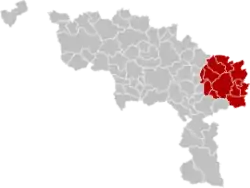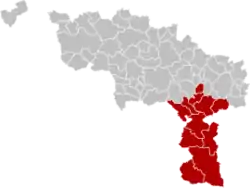Hainaut Province
Hainaut (/eɪˈnoʊ/, also US: /heɪˈ-, ɛˈ-/, UK: /ˈ(h)eɪnoʊ/,[5][6][7] French: [ɛno]; Dutch: Henegouwen [ˈɦeːnəɣʌuə(n)] ⓘ; Walloon: Hinnot; Picard: Hénau), historically also known as Heynault in English, is a province of Wallonia and Belgium.
Hainaut
Heynowes | |
|---|---|
.svg.png.webp) Flag .svg.png.webp) Coat of arms | |
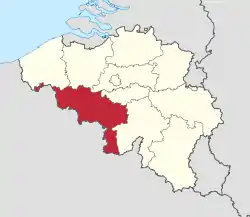 | |
| Coordinates: 50°30′N 3°55′E | |
| Country | |
| Region | |
| Capital | Mons |
| Largest city | Charleroi |
| Government | |
| • Governor | Tommy Leclercq |
| Area | |
| • Total | 3,813 km2 (1,472 sq mi) |
| Population (1 January 2019)[2] | |
| • Total | 1,344,241 |
| • Density | 350/km2 (910/sq mi) |
| Gross Regional Product[3] | 2021 |
| - Total | €36.940 billion |
| - Per capita | €27,500 |
| HDI (2018) | 0.888[4] very high · 11th of 11 |
| Website | portail |
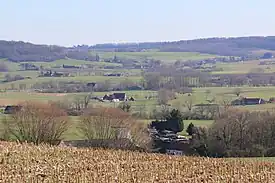
To its south lies the French department of Nord, while within Belgium it borders (clockwise from the north) on the Flemish provinces of West Flanders, East Flanders, Flemish Brabant and the Walloon provinces of Walloon Brabant and Namur.
Its capital is Mons (Dutch: Bergen) and the most populous city is Charleroi, the province's urban, economic and cultural hub, the financial capital of Hainaut and the fifth largest city in the country by population. Hainaut has an area of 3,831 km2 (1,479 sq mi) and as of January 2019 a population of 1,344,241.[8] Another notable city is Tournai (Dutch Doornik) on the Scheldt river, one of the oldest cities in Belgium and the first capital of the Frankish Empire.
Hainaut province has a rolling landscape, except for the very southern part, the so-called Boot of Hainaut, which is quite hilly and belongs to the Ardennes and its foothills Fagne and the Condroz.
The village of L'Escaillère in the utmost southeastern corner, at an altitude of 365 metres, is the highest point of the province.
In the Boot of Hainaut on the border of Namur province the artificial five Eau d'Heure lakes are situated, the largest lake area of Belgium.
A well-known region is the Borinage, the old coal mining region around the city of Mons. Also well-known is the Pays des Collines (English Hill Country), a low hilly area forming one natural region with the Flemish Ardennes in the East Flanders province.
Language
Picard is spoken in the western and centre parts of the province, while in the eastern part a mixture of Walloon and Picard is spoken (Wallo-Picard).
Some Flemish and Brabantic is spoken in the municipalities bordering the Flemish region.
History
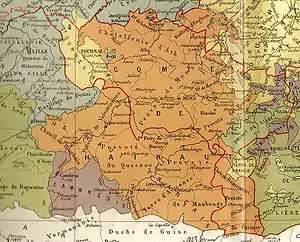
The province derives from the French Revolutionary Jemmape department, formed in 1795 from part of the medieval County of Hainaut, the small territory of Tournai and the Tournaisis, a part of the county of Namur (Charleroi), and also a small part of the Prince-Bishopric of Liège (Thuin). (A large part of the historical county of Hainaut is now within France and sometimes referred to as French Hainaut.)
Subdivisions
Hainaut province is divided into 7 administrative districts (arrondissements), subdivided into a total of 69 municipalities. It has an area of 3,831 square kilometres (1,479 sq mi).
Arrondissements
Municipalities
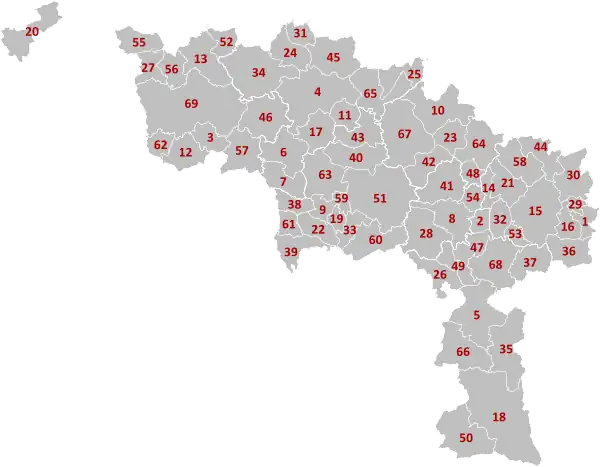
Governors
- Jean-Baptiste Thorn (1836–1841)
- Charles Liedts (1841–1845)
- Édouard Mercier (1845–1847)
- Augustin Dumon-Dumortier (1847–1848)
- Adolphe de Vrière (1848–1849)
- Louis Troye (1849–1870)
- Joseph de Riquet de Caraman-Chimay (1870–1878)
- Auguste Wanderpepen (1878)
- Oswald de Kerchove de Denterghem (1878–1884)
- Auguste Vergote (1884–1885)
- Joseph d'Ursel (1885–1889)
- Charles d'Ursel (1889–1893)
- Raoul du Sart de Bouland (1893–1908)
- Maurice Damoiseaux (1908–1937)
- Henri Van Mol (1937–1940)
- Émile Cornez (1944–1967)
- Emilien Vaes (1967–1983)
- Michel Tromont (1983–2004)
- Claude Durieux (2004–2013)
- Tommy Leclercq (2013 – present day)
Economy
The Gross domestic product (GDP) of the province was 34.2 billion € in 2018, accounting for 7.4% of Belgium's economic output. GDP per capita adjusted for purchasing power was 22,500 € or 75% of the EU27 average in the same year. Hainaut is the province with the second lowest GDP per capita.[9]
Miscellaneous
The patron saint of the province Hainaut is Saint Waltrude.[10]
References
- "Be.STAT".
- "Structuur van de bevolking | Statbel".
- "EU regions by GDP, Eurostat". Retrieved 18 September 2023.
- "Sub-national HDI - Area Database - Global Data Lab".
- "Hainaut". The American Heritage Dictionary of the English Language (5th ed.). HarperCollins. Retrieved 17 April 2019.
- "Hainaut" (US) and "Hainaut". Lexico UK English Dictionary. Oxford University Press. Archived from the original on 2020-03-22.
- "Hainaut". Merriam-Webster.com Dictionary. Retrieved 17 April 2019.
- "Structuur van de bevolking | Statbel".
- "Regional GDP per capita ranged from 30% to 263% of the EU average in 2018". Eurostat.
- St. Waltrude at saints.sqpn.com. Retrieved 26.March 2013.
External links
- Official web site of the Hainaut province (available in French)
- Official gateway to the Hainaut (available in French and Dutch )
- The Chamber of Commerce and Industry of Hainaut (available in French and English)
- Euro Info Centre Hainaut (available in French)
- Walloon Settlers Monument

